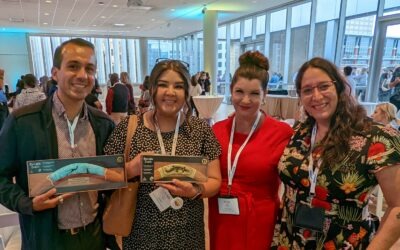Ashleigh Brand
Project Leader of the Kaleidoscope Initiative for the City of Stirling
Q: How did the Kaleidoscope Initiative change your local ecosystem?
A: When we started two and a half years ago, we realised that many of our local businesses weren’t accessing or utilising the culturally diverse workforce. We worked with businesses and organisations to help them understand the opportunities that diverse workforces bring to them; from bottom-line benefits to improved problem solving, creativity and innovation. We looked at ways to improve their cultural competency, and build skills in the management of diverse teams.
Since September 2018 the Kaleidoscope Mentoring Program has supported over one hundred mentees, and most of them found employment in their industry soon after completing the program. We are also advocating for policy change to address systemic issues, and I’ve seen big changes in some areas. Many of our local authorities and think tanks are now looking at the issue of unemployment and underemployment in the migrant sector.
We have been recognised as the leading local government for the Kaleidoscope Initiative project in Australia, and won the National Award for Local Government‘s overall Excellence Award in 2019. Other organisations and local governments are looking at the transformative impact of our program on the local economy, and the local community.
Q: What is your relationship with Welcoming Cities?
A: City of Stirling was one of the first local governments in Western Australia to commit to the Welcoming Cities framework. We are the largest local government area, with the highest number of people from culturally diverse backgrounds, and people born overseas. This includes both skilled and lower skilled migrants and refugees. We want newcomers to feel welcome and contribute to the region, whether or not they choose to settle here long-term.
Australia has a list of occupations for which it is currently looking to recruit, so people whose skill set is on the list often arrive assuming that they will be able to find employment. When they arrive, they meet numerous obstacles such as language barriers, unrecognised qualifications, and some employer’s unconscious bias.The current research indicates that 40% of people coming to Australia are overqualified for their roles. If we can fix this mismatch, the economy wins and the individuals win, and we are working with Welcoming Cities to close the gaps.
Q: What are the local community groups that you directly engage with?
A: We consult a number of different community groups and organisations: the Bhutanese Society of Western Australia, the Organization for African Communities, the Iranian Association of Western Australia, the Indian Society of Western Australia, and many others. A lot of our mentors come from our relationship building with professional organisations like Engineers Australia.
In the past, most of the community groups had focused their attention primarily on events and celebrations, rather than on the issue of unemployment. Building our credibility as collaborators in order to tackle this issue took time; the community groups needed to see the impact of our work on their members.
Q: How do you make space for collaborations?
A: We were very happy that we were recently able to facilitate the self-organization of some of our community groups into cross-cultural collaborations. My colleague assisted the Organization for African Communities in their application for a community grant to run ‘job readiness’ workshops. They secured the grant, devising a program based on their knowledge and experience, and invited other communities to attend and learn from it.
Q: How do you support your mentors?
A: We offer training in mentorship and leadership, and we provide online tools. We also have a dedicated Mentoring Coach who is there to support mentors if they encounter any difficulties. Mid-way through the three month mentorship cycle they attend Cultural Competency Training, along with their mentees. The program is a good career development opportunity, and it helps them gain global insight into how their industry operates.
Q: What is your favourite story of impact?
A: The participants in our Kaleidoscope Mentoring Program come from a variety of sectors including engineering, medical, banking, research, legal, and community services. Many of these highly skilled newcomers have worked for years as waitresses or construction workers, before meeting their mentors and receiving their valuable one-to-one support. Through our program they have developed their soft skills, and increased their understanding of Australian workplace culture and recruitment practices; this has put them back on the right path to reconnect to their career in Western Australia.
Many of our mentors are migrants themselves, and they often say, “We wish we had had a program like the Kaleidoscope when we arrived – it would have made such a difference for us.” It is a powerful program that is a win-win for newcomers and Western Australian communities: we are able to employ people to their full potential, and they are able to offer their skills, knowledge, and creativity to the local economy.



